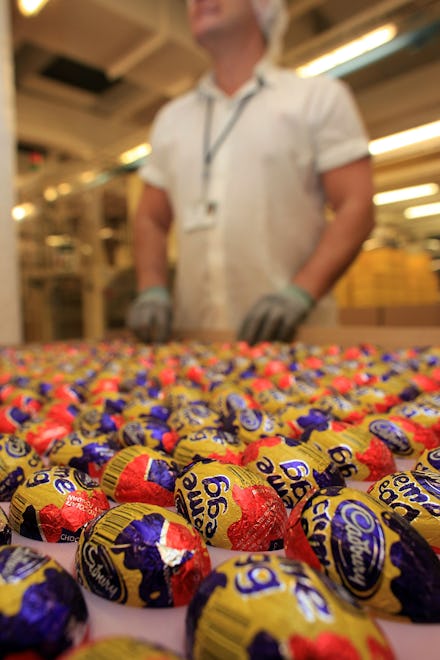Cadbury Creme Eggs are banned in the US, but here's why you can still buy them

British candy aficionados may remember the frigid January of 2015, when a cold war between British Cadbury importers and the American Hershey Company ended with the banning of the sale of U.K.-created Cadbury candies in the United States. No candies were dumped into Boston Harbor, but still, it was dramatic, on Twitter and IRL.
The ban effectively is this: Because Hershey's has permission to manufacture and package its own version of Cadbury candies, albeit with a different recipe, the U.S. candy company did not want British importers to compete with their American-born-and-bred renditions of the British classics.
The drama all went down in settlements out of court, so don't expect an FX recreation of the proceedings, which were indeed disappointing. In the settlement, Let's Buy British Imports agreed to stop importing products competing with Hershey's, including Kit Kat bars made in the United Kingdom and the beloved creme eggs.
Though American-made Cadbury chocolates have been available since the ban, as the New York Times explained, the American sweets are not as delicious. British chocolate has a higher fat content, with its first ingredient listed as milk, compared to American Cadbury's, where the first ingredient is sugar. Sounds about right. American-made Cadbury chocolates also "include PGPR and soy lecithin, both emulsifiers that reduce the viscosity of chocolate, giving it a longer shelf life" whereas "British Cadbury bars also use PGPR, as well as vegetable fats," according to the Times.
But while you can settle for American-made Cadbury products, like the special Halloween Screme Egg, which oozes neon green goo as if the Hershey's candy is competing to be in a retro Nickelodeon slime special, British Cadbury products are still available on U.S. soil.
In October 2015, British shop owner Nicola Perry of New York's Tea and Sympathy told Vanity Fair that she was #winning the war against Hershey's.
The magazine reported that Hershey's lawsuits were the "legal equivalent of brushback pitches" (that's a baseball metaphor for something that pretty much doesn't count). Though the major import companies couldn't offer competing goods, a handful of smaller importers could stock Tea and Sympathy's shelves with sticky British delights, though the products may perhaps be sold under wraps as to not to arouse suspicion. For consumers, British candies can, of course, also be legally purchased online, from sites like Jolly Goods.
Next time you see a Cadbury product on an American shelf, check where it was made. If it's a Made in America replica (essentially), you're not really getting the authentic product. If it's British, perhaps it was smuggled in, stockpiled during early panic of the Great Cadbury Ban or sourced from a small business. Ask! Every chocolate has its story.